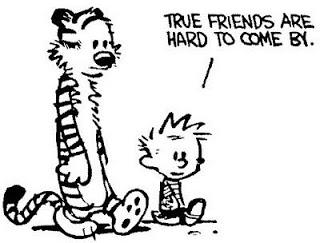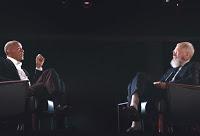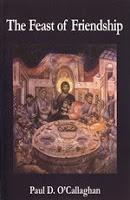 [Cross-posted to By Common Consent]
[Cross-posted to By Common Consent]Friendship is one of the grand fundamental principles of 'Mormonism'; [it is designed] to revolutionize and civilize the world, and cause wars and contentions to cease and men to become friends and brothers....Friendship is like Brother [Theodore] Turley in his blacksmith shop welding iron to iron; it unites the human family with its happy influence.
Or so Joseph Smith, the founder of my religious tradition, was recorded as saying on July 23, 1843. To my mind, it's heavy doctrine--and the fact that I take his claims about friendship so seriously has been on my mind lately, for a variety of reasons.
For starters, I would bet that just about everyone who happens to read this is likely connected to a particular web of online associations which, thanks to the power of capitalist branding, has gotten away with labeling everyone involved in its operations as "friends" (and we keep using that term, even though some research shows that most of your Facebook friends are anything but). The influence of this technologically enabled shift in our social perspective is so great that the Powers That Be behind it can just make up "Friend Day" holidays, one of which probably popped up on your FB page just yesterday, like it did mine--and based on clicks, people appear willing to go along with it.
Of course, some of you have escaped the tentacles of Facebook. If so, you have my admiration. But Twitter, YouTube, Instagram, Tumblr, and so much more (blogs included!) inundate us nonetheless. And all of it, no matter what the honest exchange of information or entertainment or empathy or interest they enable, nonetheless depending upon a virtual simulacrum of friendship, as a substitute (and, sometimes, a replacement) of the real thing.
 This semester, I'm teaching an honors seminar focusing on technology, and I started out the class by giving my students three open-ended questions that relate to various technology-related issues, one having to do with jobs, one having to do with teaching, and one having to do with social media. Nearly every student chose the social media topic, and nearly every one of them said the same thing--that while they'd never give up their phones, they were pretty certain technology had made them more frustrated, more lonely, and more isolated. (A couple of students went so far as to describe themselves as "trapped" by their phones and all the attendant expectations and norms that come with them.)
This semester, I'm teaching an honors seminar focusing on technology, and I started out the class by giving my students three open-ended questions that relate to various technology-related issues, one having to do with jobs, one having to do with teaching, and one having to do with social media. Nearly every student chose the social media topic, and nearly every one of them said the same thing--that while they'd never give up their phones, they were pretty certain technology had made them more frustrated, more lonely, and more isolated. (A couple of students went so far as to describe themselves as "trapped" by their phones and all the attendant expectations and norms that come with them.) As it happened, a cool, off-beat, local Christian organization here in Wichita, the Eighth Day Institute, hosted just this past weekend a symposium titled "Friendship in a Fractured Age"; the keynote speaker was Ken Myers, of Mars Hill Audio, and the main theme of his address was "Social Media and the Commodification of Friendship." I shared with him the anecdote from my class, and in response he shared some other research and surveys he had access to which showed such attitudes aren't rare. The kids aren't dumb, my fellow Gen Xers and Baby-Boomers and even older folks; they know that, at least in some ways, at least some of the time, they are relying upon social media platforms and tech companies and buzz phrases to create the sort of memorable, personal, intimate, tactile connections and friendships which they've learned all about from us, from their parents, from television programs and movies and books, all of which celebrated friendships...and are often finding, unfortunately, that the commodified substitutes of the day just don't do the trick.
As it happened, a cool, off-beat, local Christian organization here in Wichita, the Eighth Day Institute, hosted just this past weekend a symposium titled "Friendship in a Fractured Age"; the keynote speaker was Ken Myers, of Mars Hill Audio, and the main theme of his address was "Social Media and the Commodification of Friendship." I shared with him the anecdote from my class, and in response he shared some other research and surveys he had access to which showed such attitudes aren't rare. The kids aren't dumb, my fellow Gen Xers and Baby-Boomers and even older folks; they know that, at least in some ways, at least some of the time, they are relying upon social media platforms and tech companies and buzz phrases to create the sort of memorable, personal, intimate, tactile connections and friendships which they've learned all about from us, from their parents, from television programs and movies and books, all of which celebrated friendships...and are often finding, unfortunately, that the commodified substitutes of the day just don't do the trick. Don't believe these weird, Wendell-Berry-reading conservative Christians? Well, then how about former president Barack Obama? In the first episode of David Letterman's new Netflix show, Obama talked for a while about social media, which his 2008 campaign for the White House depended heavily upon, but which has now shown us not only how the increasingly sophisticated algorithms those social media platforms employ can easily generate and entrench "completely different information universes," but also how "people in power, special interests, foreign governments, etc." can essentially set the terms for how so many of us judge what to believe and whom to trust. I suppose one could argue that this sort of prostitution and manipulation of the human desire for knowledge and belonging and friendship has been going on as long as any kind of print or electronic media has existed; it's not like fake news or the pre-internet versions of catfishing and bullying and all the rest didn't exist before the invention of phones that we can carry around in our pockets. But all the same, to assume that if one can point out antecedents to contemporary distrust, tribalism, and alienation, that therefore there is no reason to think contemporary complaints about such can possibly represent something genuinely new and threatening to what Joseph Smith was talking about is, I suspect, profoundly wrong.
Don't believe these weird, Wendell-Berry-reading conservative Christians? Well, then how about former president Barack Obama? In the first episode of David Letterman's new Netflix show, Obama talked for a while about social media, which his 2008 campaign for the White House depended heavily upon, but which has now shown us not only how the increasingly sophisticated algorithms those social media platforms employ can easily generate and entrench "completely different information universes," but also how "people in power, special interests, foreign governments, etc." can essentially set the terms for how so many of us judge what to believe and whom to trust. I suppose one could argue that this sort of prostitution and manipulation of the human desire for knowledge and belonging and friendship has been going on as long as any kind of print or electronic media has existed; it's not like fake news or the pre-internet versions of catfishing and bullying and all the rest didn't exist before the invention of phones that we can carry around in our pockets. But all the same, to assume that if one can point out antecedents to contemporary distrust, tribalism, and alienation, that therefore there is no reason to think contemporary complaints about such can possibly represent something genuinely new and threatening to what Joseph Smith was talking about is, I suspect, profoundly wrong.At the very least, the fact that friendship, its range or quality or absence, is something much talked about today is undeniable. (Within my own Mormon tribe, the discussion has been near constant for a while now.) Ken Myers, at the conclusion to his presentation, reminded us all of the promise of scripture that someday we would see God and one another "face to face," and that the friendship Jesus Himself offers all His disciples is tied to "speaking plainly, and using no figure of speech"--which, I would warrant, doesn't include emojis. Myers expressed his fear that our overwhelmingly--and, increasingly, our economically mandated--networked and wired world would lead those who move through it (namely, all of us) to form their hopes, their expectations, and their faith completely separate from that beautiful vision. In a small way, I suspect that endless the social media-driven arguments I mentioned above over who can be a friend to whom are at least partly shaped by this loss of the face-to-face.
Count yourself lucky if you don't know what I'm talking about. The FB friend, the Tweet responder, the anonymous e-mailer, all of whom wonder how you could possibly support that cause, or forward that article, or agree with that comment, when this other perspective on that cause, or this other reading of that article, or this other context for that comment, clearly shows its ugliness, its violence, its self-loathing, its incoherence, its immorality, its Trump-supporting awfulness. Can't you see this is anti-Christian? Can't you see this is racist? Can't you see this targets that group, this undermines that principle, this excludes that obvious and necessary truth? How can you call yourself a Mormon/an American/a leftist/a decent human being while you tolerate such nonsense? What kind of monster are you anyway?
In my experience, in the midst of such faceless back-and-forths (which, I state for the record, I actually kind of like, because I dig arguments, and because I usually fail to recognize if something has become poisonous until long after it became such), saying that you know the author or the situation personally, that you've talked with them face-to-face, that you've spent time and sweat into engaging with these issues, that you've broken bread and been silly and personal and private with all of the above, and thus can't quite accept the reductive accusations about these individuals and movements being tossed around, rarely makes much difference. And, of course, maybe it shouldn't (the curt "so what if they're nice people? Hitler liked puppies too"-style of response is kind of silly, but not without a point). But more than I fear for the loneliness of my students, or for the stress of juggling multiple Facebook friends groups, I fear that the absence of the personal, the intimate, the tactile, the face-to-face in our friendships is resulting in a shrinking and contorting of our ability to feel love for our fellow human beings. When the first thing we learn about a person, or the thing about them which most consistently comes through our algorithms and screens, is that they participated in the Women's March (and therefore are pink-hat-wearing, religion-hating, exclusionary SJWs) or that they like some Republican candidate (and therefore are gay-bashing, theocracy-building, white supremacist Trump supporters), the narrowing and maximizing and personal-difference-and-nuance-crushing logic of our electronic tribes is only strengthens.
It isn't uncommon, I think, for people who hold to Christian teachings to insist that you can keep these different tracks separate, and hence that our ability to exercise love--meaning charity or agape--towards all our fellow human beings isn't undermined when we also willingly cultivate (or passively allow our commodified arts of "friendship" to cultivate for us) a complete loathing of everything this particular segment (or segments) of our fellow human beings say or do or affirm. Call it just the latest iteration of the whole deceptively simple "hate the sin, love the sinner" nonsense. It is nonsense with a long pedigree in Christian thinking. Kierkegaard, among others, said Christians shouldn't be bothered by mere friendship, or presumably or the lack of it; in his view philia, that form of love which is fundamentally characterized by freedom and partiality (we choose to be friends with this person, but not that one; we choose to be loyal to our friend; if the friendship comes to an end, it's because we choose it), was essentially pagan, and an unworthy companion to the rigorous (and admittedly, sometimes de-humanizing) universality of Christian charity.
 At the Eighth Day symposium, there was also a presentation given by Protopresbyter Paul D. O'Callaghan, from St. George Orthodox Christian Cathedral here in Wichita. He's written a short, fine little book, The Feast of Friendship, which makes a solid case--drawing upon Bible stories, the Patristic tradition, personal observations, and a great deal of philosophy and psychology--for seeing in our human ability to choose to make and maintain particular, partial friendships, even (perhaps even especially) in the midst of great differences, something holy. He writes:
At the Eighth Day symposium, there was also a presentation given by Protopresbyter Paul D. O'Callaghan, from St. George Orthodox Christian Cathedral here in Wichita. He's written a short, fine little book, The Feast of Friendship, which makes a solid case--drawing upon Bible stories, the Patristic tradition, personal observations, and a great deal of philosophy and psychology--for seeing in our human ability to choose to make and maintain particular, partial friendships, even (perhaps even especially) in the midst of great differences, something holy. He writes:Fundamentally, genuine friends grant us access to the most creative dimensions of our souls by receiving us and reflecting us back to ourselves. In this way, we are able to see what could not be seen before. We encounter our own identity and possibilities in fresh and dynamic ways. We can act in a manner previously unthinkable to us. Friends liberate our own inner resources for God's disposal, and thus are channels for the mediation of his grace to us (p. 96).
And also:
To answer Kierkegaard: yes, in this world, the practice of unrequited agape is essential to the Christian life. But one cannot survive on agape alone. We share vital loves within our families, and in addition to that, the philia between friends deepens and enriches love's place in our lives. It does not matter if it is experienced within the confines of the fixed social hierarchies of traditional societies or in the fluid and free associations characteristic of modern Western culture. Friendships realize the vital communion of love given and received (p. 125).
O'Callaghan's modified defense of modernity in that last passage should indicate that it's not as though the only sort of friendship which he thinks ought to be considered acceptable to concerned Christians is one untouched by technological tools of connection. (Both he and Ken Myers, when I saw them at the conference, both had smartphones, for whatever that's worth.) The more important point, I think, is that the freedom which characterizes real--not fake--friendship, can withstand all sorts of diversions and differences. (Even, I should note, gender differences; while O'Callaghan is quite traditional in his thinking about sexuality and sexual morality, and appropriately so, he has little sympathy for the "fundamentalist" notion that women and men can't choose to be friends; he writes that such rigidity denies "the essential primacy of the person, created in the image and likeness of God"--p. 109.) To confront those differences, to see and know and come to enjoy the association with the actual human being or the actual living organization that generates those perspectives from which we differ or experience challenges or even suffer embarrassment is part, I think, of the process by which God opens up ourselves to ourselves, thus teaching us better just what our capacity to feel charity both towards our friends and our enemies (and, I suppose, our frenemies in between) really is. But it must be a real friendship, I think, one grounded in, or at the very least characterized by, our lived-in, and not wholly mediated, materiality.
Like every good Generation Xer, I was taught by They Might Be Giants that, at some point, the racism--or the anti-Mormonism, or the homophobia, or the classicism, or the Trump-defending, or the insistence upon any number of other perceived slights and/or genuine evils--might become so explicit, so indicting, that you need to rethink the partiality by which you choose to view the person or cause or idea that you feel affection for. "Can't shake the devil's hand and say you're only kidding" isn't wrong. But note, in closing, that the context of that song, and the point of decision it describes, the realization that one's friend really is a devil, is an actual, bodily experienced party. Not a chat room, not an FB group, not an e-mail chain, not a Tweetstorm, but an actual, face-to-face encounter, with actual "bobbing and pretending," hearing words actually spoken complete with their whole history and their body language and their social cues along with them. The friendship Smith praises was liked to welding iron to iron--which means a real physical unity, a real handling of the different shapes of iron in hand, with real heat applied to see if their edges can come together. Nothing virtual there. Maybe if we kept ideal as our rule of thumb, and sought for such whenever and however we can, if only as a necessary supplement to all the other wired connections in our lives, then perhaps the twin poles of alienation and extremism might lessen in force, and our confusion over the holiness of simple friendships could be a little lessened as well.
